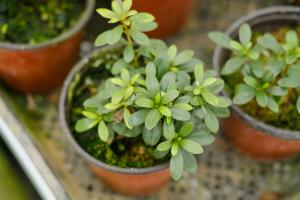Can You Plant Herbs Together: A Guide to Companion Planting
Introduction
Growing herbs is an enjoyable and rewarding experience that can be enhanced by companion planting. Companion planting is a technique that involves growing different plants together to provide mutual benefits. In this article, we will explore if you can plant herbs together and the benefits of doing so.
What is Companion Planting?
Companion planting is a method of growing two or more different plants near each other to improve the health, yield, and flavor of the plants. Some plants are known to have complementary effects when grown together. For example, one plant may help repel pests that could otherwise harm the other plant, while another plant may improve soil quality by fixing nitrogen.
The Benefits of Planting Herbs Together
Planting herbs together can provide numerous benefits. Firstly, it can help to repel pests, attract beneficial insects and increase pollination. For example, planting basil and parsley together can help to keep pests such as aphids and whiteflies away from your plants. Secondly, planting herbs together can help to conserve space, particularly in smaller gardens. Thirdly, planting herbs together can create an attractive and functional garden. For example, planting different colored varieties of thyme and rosemary can create a beautiful and fragrant display.
Which Herbs Can Be Planted Together?
Some herbs grow particularly well together, while others may not thrive when planted together. Here are some herbs that are known to be great companions:
1. Basil and Parsley: As previously mentioned, planting these herbs together can help repel pests and attract beneficial insects.
2. Thyme and Rosemary: These herbs complement each other well and are often used in similar dishes.
3. Chives and Dill: Planting these herbs together can help to repel pests, as chives have a mild insect repellent effect, while dill attracts beneficial insects.
Which Herbs Should You Avoid Planting Together?
While some herbs grow well together, others may inhibit each other's growth or attract pests. Here are some herbs that should not be planted together:
1. Mint and Sage: Mint is known to spread rapidly and can suffocate other plants, while sage may inhibit the growth of neighboring plants.
2. Fennel and Dill: While dill is a great companion for many herbs, it should not be planted near fennel. Fennel produces a chemical that can inhibit the growth of nearby plants, including dill.
3. Basil and Rue: Rue can inhibit the growth of basil and should be planted separately.
In Conclusion
Growing herbs is a wonderful way to add flavor and fragrance to your garden and home. By learning about companion planting, you can create a thriving herb garden that provides numerous benefits. Remember to choose complementary herbs, avoid pairing herbs that don't work well together, and enjoy the process of learning and experimenting with different combinations.

 how many times do yo...
how many times do yo... how many planted tre...
how many planted tre... how many pine trees ...
how many pine trees ... how many pecan trees...
how many pecan trees... how many plants comp...
how many plants comp... how many plants can ...
how many plants can ... how many plants and ...
how many plants and ... how many pepper plan...
how many pepper plan...































